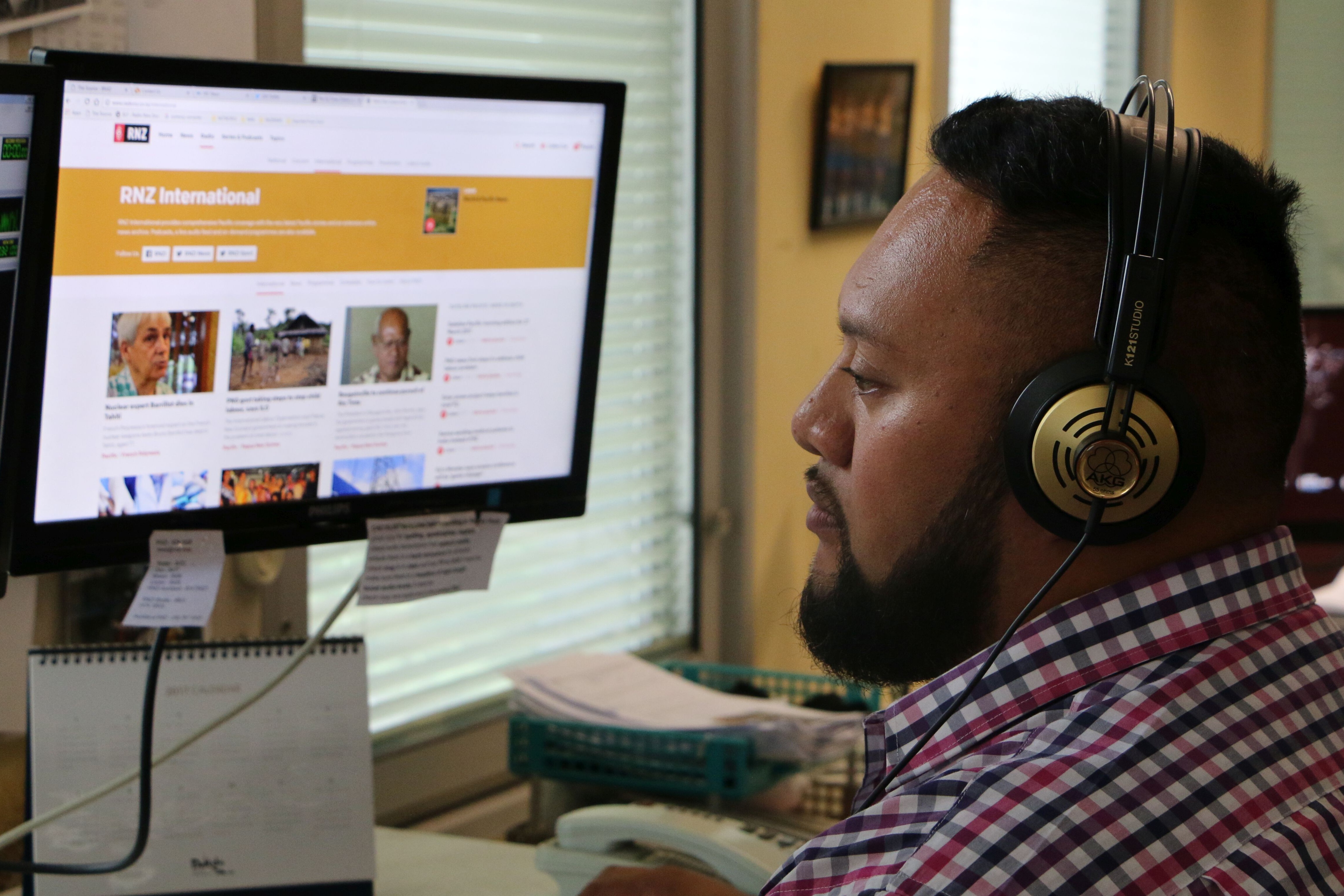This year, with support from the BBC Grace Wyndham Goldie Trust, the PMA provided eight travel bursaries that enabled media professionals to spend time exploring key issues in public media around the world.
The support we receive from the Grace Wyndham Goldie Fund for our bursaries enables the PMA to identify professionals and projects that benefit organisations as well as individuals. The bursaries are all very different but they allowed the participants to share knowledge and experiences as well as enabling them to forge future alliances between media organisations.
This year’s intake included a senior media professional exploring how to make programmes that specifically target younger audiences, an editor keen to embrace digital broadcasting, a journalist pushing investigative journalism to new limits in his region, broadcasters devising production and social media guidelines and a key commissioner from a bi-lingual station who embarked on a study tour of one of the world’s leading PSB’ to learn on how to make and commission new drama.
Beyond the wider aim of developing knowledge and skills, PMA bursaries provide unique opportunities for networking. They also enable individuals to develop new ways of exercising freedom of expression and facilitate work on projects that support the Sustainable Development Goals (SDGs).
The Public Media Alliance is grateful to the Grace Wyndham Goldie Trust for their continued support for these bursaries and for upholding the values of Public Service Broadcasting globally.
Find out below about our bursars’ experiences!
Vashan Brown
Vashan is a reporter from RJR Television Jamaica who wanted to improve programme production at the broadcaster and to build on his experience by compiling a production manual with best practices and tips on how to create and structure content. Vashan used his bursary to head to the Canadian Broadcasting Corporation (CBC) to find out how CBC maintains high production standards.
Right from the start, Vashan was impressed with the work that goes into the daily newscasts at the CBC. “I was blown away by just how many meetings are held daily to ensure that the stories covered in all the major newscasts are given excellent treatment”.
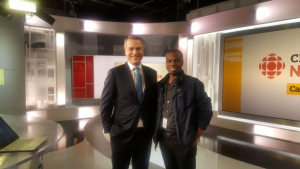
Vashan had the opportunity to observe different teams at work and the process of putting each news story together.
“During the live show, I saw how the producers worked together to ensure the production was smooth. I was impressed by how they assign various tasks to different people,” he recalls. “So, one producer’s role was to coordinate the overall show while another producer coordinated the LIVE field reports from various reporters. There is also a producer responsible for coordinating Skype Interviews as well as someone responsible for on screen stickers or banners. This kind of planning will undoubtedly help our process at TVJ.”
Vashan was also given the CBC’s guide for reporters, The Journalistic Standards and Practices, which he will use to update the Code of Ethics for RJR/Gleaner Group, and for Television Jamaica’s Newsroom.
Overall Vashan says
“It was a great experience. I am now in the process of compiling the Production Manual for the news centre. I will also update TVJ’s Code of Ethics based on the CBC’s Journalistic Standards and Practices. Additionally, I am writing a list of recommendations to the TV News Editor so that we can better plan our daily newscasts and weekend packages. I am very grateful for this opportunity and thank everyone involved for offering me this bursary”.
Koro Vaka’uta
Koro investigated the increasingly tense relationship between Tonga’s Prime Minister, ‘Akilisi Pohiva, and the public broadcaster, the Tonga Broadcasting Commission (TBC). Karo’s goal was to observe and report on the impact of the souring relationship between TBC and the government. His focus was specifically on public access to information and how the situation in Tongan affected fundamental freedoms.
While Koro had already done some reporting on the ongoing saga in Tonga, this bursary allowed him to be on the ground and get a better sense of the mood among the media community in Tonga and the TBC staff. During his time in the Pacific Island, Koro was also able to gather several ‘off-the-record’ comments from members of the community as to their dissatisfaction with the Prime Minister, including his handling of the TBC situation.

During the trip Karo spoke to two of the most prominent media operators in Tonga, the Chair of the Tonga Media Council and Matangi Tonga’s, Pesi Fonua, and the former media advisor for the PM and publisher of the Taimi ‘o Tonga, Kalafi Moala. In addition, while in Tonga, Karo was also able to cover other areas of news interest including the cancellation of the Pacific Games and other stories.
“I am thankful to the BBC Grace Wyndham Goldie Trust and the PMA Travel Bursary for giving me the opportunity to travel to Tonga. It allowed me to compile a web feature/article and Dateline Pacific programme piece on the TBC saga and its impact on media freedom in the island kingdom”
Read Koro’s final piece from his experience.
Thandeka Mabona
Thandeka’s objective was to observe and study how Mauritius Broadcasting Corporation (MBC) educational programming could be adopted by the South African Broadcasting Corporation (SABC) to revive its children’s news programmes.
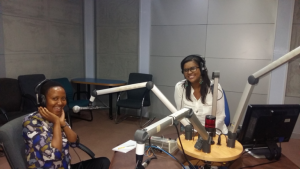
Thandeka’s first day was packed with nothing but fulfilling experiences as she worked at MBC, her priority destination during this visit. During one of her days at the broadcaster, Thandeka sat with an award-winning journalist, Nathalie Didier, as she was waiting for her guest to talk about women’s empowerment on the show, O Femin Magazine on Kool FM. When the guest did not arrive, Nathalie did not think twice and put Thandeka on air. This promised to be the most fascinating hour of her life as they spoke about Thandeka’s challenging journey to success in the media.
Thandeka was also able to go out with Sarah, one of the young television journalists at MBC, to film a story on of drug abuse among young people in Mauritius. This topic was very close to Thandeka’s heart as several schools in South Africa are not operating optimally due to drugs issues. On her return to the MBC headquarters, Sarah taught Thandeka how to edit. This proved to be a great experience for Thandeka, as SABC journalists often lack this skill because the broadcaster has a huge workforce of editors.
After discovering that the main kids’ channel had been discontinued due to low audience rates, Thandeka visited the Mauritius College of the Air, who had been responsible for funding it.
The College of the Air was equipped with experts who conducted extensive research primarily on education. They were in constant communication with teachers, subject advisors and curriculum developers to explore the gaps in the implementation of the curriculum and they would work together to close these gaps through information booklets, teacher’s manuals, DVD’s and programs that would be aired by the MBC.
“Special thanks to the Public Media Alliance and the Grace Wyndham Goldie Trust in making this trip possible. This was truly an opportunity of a lifetime”.
Read Thandeka’s final piece on her experience
Md. Imam Hossain
Imam, an Executive Producer at Bangladesh Television (BTV), wanted to visit Radio Television Malaysia (RTM) to observe how they have embraced digital technology. He wanted to gain experience as well as seek advice on new broadcasting software and equipment to ensure a successful switchover from analogue to digital.
Imam had a 10-day educational attachment with Radio Television Malaysia (RTM), the largest public broadcaster in Asia. His aspiration was to learn how RTM would switch over completely to HDTV within three years. During his time at RTM , Imam worked with various units, including camera, documentary, magazine, graphics and editing, where he gained valuable experience. He studied how to work in pre-production, production and post-production in drama, documentary, children’s shows as well as entertainment programmes.
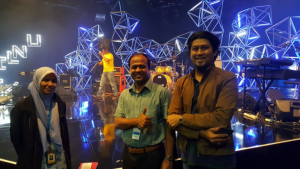
In addition to the digital transition schedule, Imam was also able to observe how RTM edited and made montage graphics using new software.
Imam was able to gain experience in RTM’s three HD studios and in the auditorium, which is used for live or record entertainment programs. Imam says
“I have enjoyed working on an entertainment program and observing how to stage light on set, this experience will make my work more effective. I talked to producers, light programmers, light directors, and engineers”.
Imam had the chance to compare RTM and his organisation and had an insight into the editing suites and programs that RTM uses for news production and documentaries.
“I have learned and experienced a lot of things from the RTM visit that I will implement with my colleagues at BTV very soon. All credit, I think, goes to PMA and Grace Wyndham Goldie Trust without whose help I would not have had this great experience and knowledge of HDTV Programme Production. Very soon I am going to offer a presentation in the meeting presided over by the DG of BTV and produce an HDTV Programme and broadcast it on BTV for our audience “.
Nerissa Pearson
Nerissa used her travel bursary to do an internship with the Caribbean Broadcasting Corporation (CBC) to improve her broadcasting skills as well as to visit and talk to heads of institutions and Government officials. The aim was to find out how they have been tackling the 4th SDG on Quality Education.
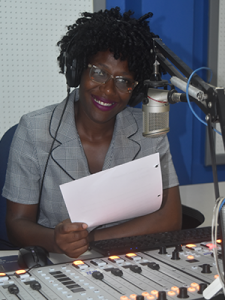
As an announcer and producer for the National Communications Network Inc (NCN) Guyana, for over ten years, visiting Caribbean Broadcasting Corporation (CBC) and Starcom in Barbados was an eye opener for Nerissa. She conducted a work placement in both organisation where she observed the innovative ways they conducted their on-air presentations and the production that went into every shift, programme and segment.
“The attachment was quite satisfying and even exceeded my expectations. I saw how comfortable and easy it was for producers to pitch their ideas after being given notice months before about the assignments they will be responsible for or involved in covering, moreover I was impressed by the support that is given by the station and programme managers to make those ideas a reality with the best quality of production.”
Nerissa’s goal was to observe and learn about on-air techniques for her personal development and bring them home to share with colleagues. While in Barbados, she also visited institutions and Government officials to find out how they have been working with the 4th Sustainable Development Goal on Quality Education, and gain first-hand experience on how they integrated their curriculum to meet the needs of a wide cross-section of people, with a specific focus on Primary Education. She hopes that the insights gained will help her in advising, sharing and comparing the quality and curriculum of the education offered in these two countries and the lessons that Guyana could learn from Barbados.
“Another important aspect to broadcasting is assessment and feedback, and both organisations I visited subscribe to an independent survey which provides them with figures on responses from listeners, peak times, programmes, stations and content. Because of the survey, they can know what their listeners like as well as what to improve on. In this regard, I think a survey would help my company so that we can better serve our listeners, this is most needed in radio broadcasting in an age where there are multiple stations and content available,” she said.
“I must extend my heartfelt appreciation to the Public Media Alliance for the travel Bursary, an opportunity to not only expand my learning, experience, morale but also to be able to greater contribute to my company.”
Mark Bassant
Mark is an investigative journalist for the Caribbean Communication Network(CCN), Trinidad. With the bursary, he visited Panama and the Dominican Republic to see how the UN Drug & Crime Office’s unit – the Container Control Programme (the CCP) functions and as part of a documentary he was producing for CCN.
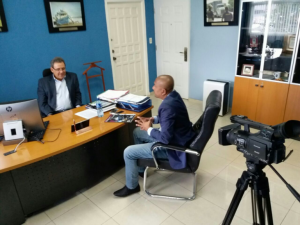
As a senior multimedia and investigative journalist, Mark always wants to dig deeper and go beyond the ordinary news story. During his time in Panama, Mark accompanied the officers as they performed their duties in real time and produced a documentary which explores how the UN Drug & Crime Office unit can stay a step ahead of the drug traffickers.
The objective was to show how effective this program had been in the countries that have adopted it in Latin America and the Caribbean, and to encourage other countries in the Caribbean to implement it.
“I was given the opportunity of speaking with several law enforcement officials that are familiar with the CCP and AIRCOP programs in the respective countries and also spoke with several public officials… I think they truly made the documentary come to life and I can safely say the objectives I set out were all met”.
At the Panama Ports, Mark was given a first-hand view about how containers are searched and profiled when they are suspected of carrying contraband of any kind.
“I was also fortunate to see first-hand how the AIRCOP program works in the Dominican Republic’s Las Americas airport where there is a prevalence of drug smugglers passing through the airport on a daily basis. I, with my cameraman, was given exclusive access to the X-ray machines and a behind the scenes look at how people are profiled and searched,” he recounts.
“I want thank the Public Media Alliance and the BBC Grace Wyndham Goldie Trust for continuing to help journalists across the world in telling stories that needs to be told despite economic restraints by media companies. The PMA continues to do an excellent job is helping fund much needed programs and activities that help enrich a journalist’s career and for that I am grateful.
I also thank the UNODC’s unwavering support for this project without their input and assistance my idea and vision for this documentary might not have been fully realised.”
Raymond Clarisse
Raymond traveled to the Canadian Broadcasting Corporation (CBC) on a study tour to meet and observe how staff in the Drama departments operate. As a Content Development manager at Seychelles Broadcasting Corporation (SBC) he wanted to gain further experience in a drama pitching unit and exchange ideas about how CBC develop’s drama and deals with independent producers. Through this experience, he hoped he would gain valuable insights on how to set up a drama department at SBC.

One of his main aims was to study the best practices of an active drama hub, to see how they deal with pitching and to follow the development processes from script to screen. He found that his organisation and CBC had a surprising amount in common considering the different sizes of the organisations.
“They [both] have a successful drama department which was once producing in house. They have moved to become a commissioning broadcaster. They have seen a great rise in their production values although they struggle to maintain annual funding for these productions. Another characteristic [in common] with the SBC is that they are bilingual”.
Raymond took part in various meetings with the Head of Drama Department at Radio Canada and his team, potential producers, the French Producers Alliance (APFC) and the high-level management of Radio Canada. These meetings gave him an insight of the day to day affairs of the department, a chance to observe pitching methods and understand the types of budget they allocate per production and provided him an opportunity to discuss pitching techniques.
“Drama is an expensive format without a doubt. I learned about their funding mechanism. The way they negotiate with producers and how it is decided on how thick the envelope is for each content. The fact that Radio Canada is a commissioning hub, it means it cannot fund projects entirely on its own.”
The high-level production values were very apparent to Raymond. “They have their own constraints but it was a time to talk about possibilities and to consider things which can be adopted for a small broadcaster like Seychelles Broadcasting Corporation”. Raymond was also able to witness a pitch session by independent producer
“It was truly an amazing experience and I truly believe that the time I spent at Radio Canada with the support of PMA & the Grace Wyndham Goldie Trust has personally enriched me in the Television Drama world. I added a lot of new knowledge, confirmed a lot of what I knew and found a few tricks along the way. I am very grateful to have done the study tour and apply a lot of what I have learnt in my work.”
Paul Myers
Paul used the bursary to work with Caribbean journalists and compile social media guidelines for the region’s broadcasters. The guidelines also set out policies and best practices to ensure that news media use social media productively and avoid common pitfalls.
Paul, with support from the PMA, organised a meeting in Barbados to discuss and create social media guidelines for the Caribbean region. The meeting was attended by 18 Journalists and individuals with an interest in media from 10 different countries in the Caribbean who discussed examples of good and bad practices and the legal implications these can have to a broadcasting organisation or an individual journalist .
Paul was also able to share with participants methods of research and verification using social media, as well as how to investigate techniques using the web. During the meeting, participants were able to develop clear guidelines which they believed had become increasingly necessary for the region. The discussion and information collected at the meeting is currently being compiled into a document which will be launched at the end of the year as a publication for broadcasters and journalists in the Caribbean to adopt.
Read more about our workshop in the Caribbean.
